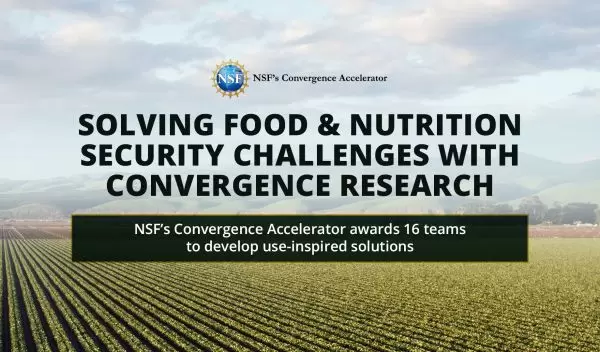
NSF spurs use-inspired research and technology development to address food and nutrition security challenges
The U.S. National Science Foundation today announced a $11 million investment to address challenges related to food and nutrition security. NSF has selected 16 multidisciplinary teams for Phase 1 of the Convergence Accelerator program’s Track J: Food & Nutrition Security.
Implementing convergence across food and nutrition sectors, Phase 1 teams under Track J will develop technologies, tools and approaches to combat challenges related to population health, climate change, and nutritional needs of vulnerable and disadvantaged communities.
By 2050, the world's population is anticipated to increase to an estimated 9.7 billion people, with a corresponding increase in food demands by 60%, water demands by 55% and energy needs by 80%, according to the United Nations Department of Economic and Social Affairs and NSF-funded workshop “Sustainable Systems Enabling Food Security in Extreme Environments and Food Deserts Employing a Convergence of Food, Energy, Water and Systems for Societal Impact Report”, led by The University of Texas at El Paso.
"New technologies could play an important role in ensuring that individuals have access to food and water in the coming decades," said Erwin Gianchandani, NSF assistant director for Technology, Innovation and Partnerships. "Through transdisciplinary, use-inspired and translational research, the projects in which we are investing today have the potential to help the most vulnerable Americans, not to mention billions of people worldwide."
Over the next nine months, the Phase 1 teams will develop their initial ideas into proofs of concept, identify new team members and partners and participate in a hands-on innovation curriculum providing fundamentals in human-centered design; team science; use-inspired research; early-stage prototyping; and communications, storytelling and pitching.
"Food and nutrition security is a new focus for the Convergence Accelerator's portfolio and we are excited to welcome these teams into our program," said Douglas Maughan, head of the NSF Convergence Accelerator. "Through our investments including the unique Convergence Accelerator curriculum, we hope to create a group of synergistic efforts that advance regenerative agriculture practices, reduce water usage, provide equitable access to nutritious and affordable food for disadvantaged communities, and spur technology and job creation."
The Track J topic was chosen based on the results of NSF-funded community workshops — selected through the NSF's Convergence Accelerator ideation process — as well as research and federal priorities to create sustainable solutions and best practices. For example, Track J is aligned with executive and congressional priorities, as evidenced by a series of recent executive orders: 13990, 14002 and 14008.
At the end of Phase 1, teams will submit formal Phase 2 proposals and pitch for up to $5 million of additional support. Over 24 months, selected Phase 2 teams will further develop their solutions and sustainability development plans.
The awardees include:
- Accelerating commercial marine fish production in US: developing sustainable feeds, establishing feed suppliers and enhancing market acceptance, led by University of North Carolina at Wilmington.
- Aqua Sacs for Sustainable Agriculture in a Changing Climate, led by Pratt Institute.
- Artificial-Intelligence-Based Decision Support for Equitable Food and Nutrition Security in the Houston Area, led by University of Houston.
- Building a digital twin for national-scale field-level crop monitoring, prediction, and decision Support, led by George Mason University.
- Convergence Towards a Disaster Resilient Food System, led by University of Maryland, Baltimore County.
- Dairy Protein Product Research and Innovation Hub, led by Boise State University.
- Data-driven Agriculture to Bridge Small Farms to Regional Food Supply Chains, led by University of Arkansas.
- Food EducatioN for Nutritional security and Empowerment in Local communities, or FENNEL, led by University of Arkansas at Pine Bluff.
- Food, Land, Water Environmental OpenSource Risk Intelligence Synthesis Model, or FLOWER-ISM, led by Mesur.io
- Increased Take-Up of Food Benefits and Consumption of Locally-Sourced Nutrient Dense Food among Vulnerable Populations, led by University of California, Los Angeles.
- MidAtlantic Food Resiliency Network: Securing the Future of Food through a Multi-Mindset Approach, led by University of Maryland, College Park.
- Network Of User-engaged Researchers building Interdisciplinary Scientific infrastructures for Healthy food, or NOURISH, led by University of California, San Francisco.
- Optimizing sustainable delivery of local fresh produce in Puerto Rico to mitigate nutrition insecurity, led by George Washington University.
- Precision Agriculture for a Resilient Vegetable Supply Amidst Climate Change, or Precision Ag4Veggie, led by Virginia Tech Applied Research Corporation.
- Predicting the effect of climate extremes on the food system to improve resilience of global and local food security, led by University of California, Santa Barbara.
- Rapid detection technologies and decision-support systems to mitigate food supply chain threats, led by University of Missouri.
Launched in 2019, the Convergence Accelerator — a Directorate for Technology, Innovation and Partnerships, or TIP, program — builds upon NSF's investment in basic research and discovery to accelerate solutions toward societal and economic impact. Convergence Accelerator multidisciplinary teams use convergence research fundamentals and innovation processes to stimulate innovative idea sharing and development of sustainable solutions.
More information about the Convergence Accelerator program is available at
